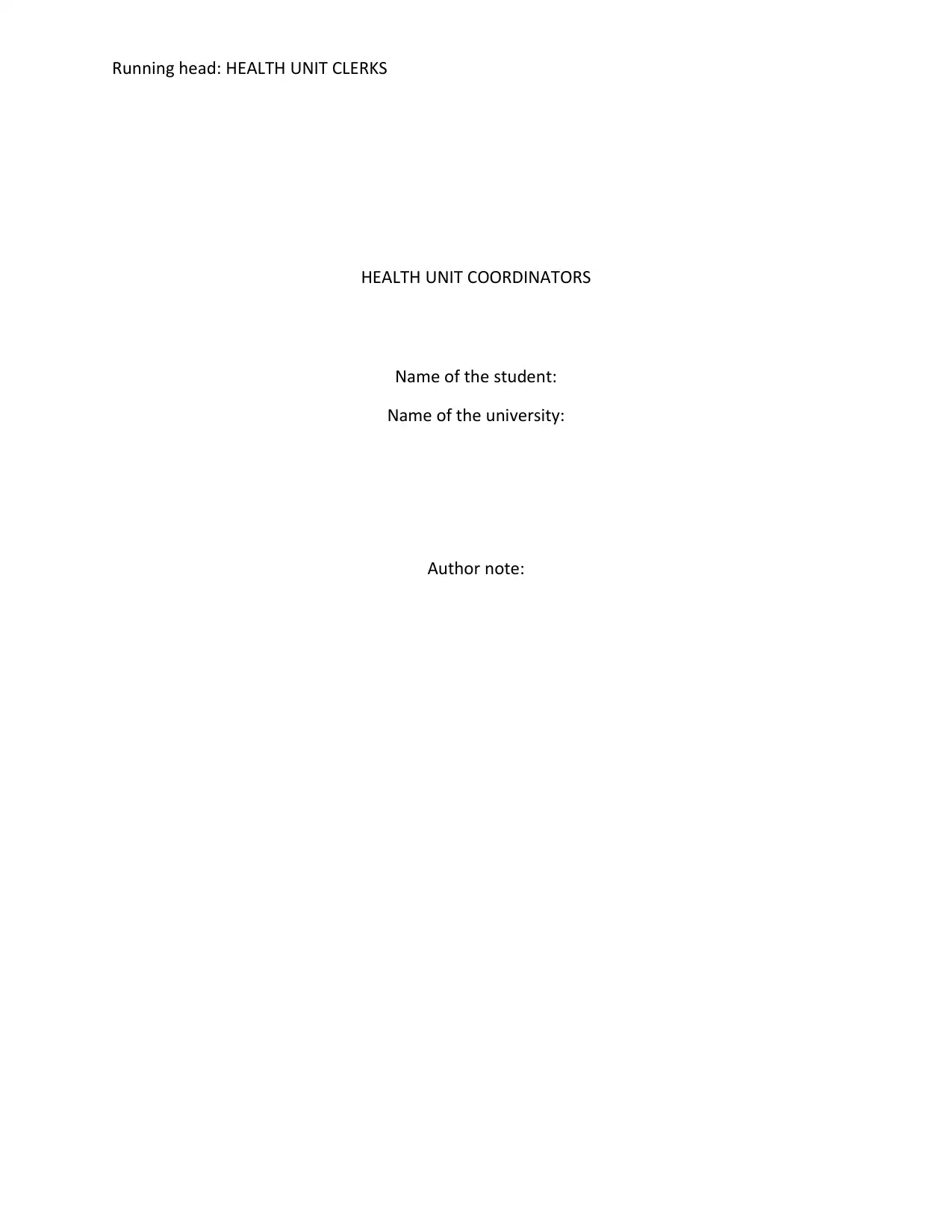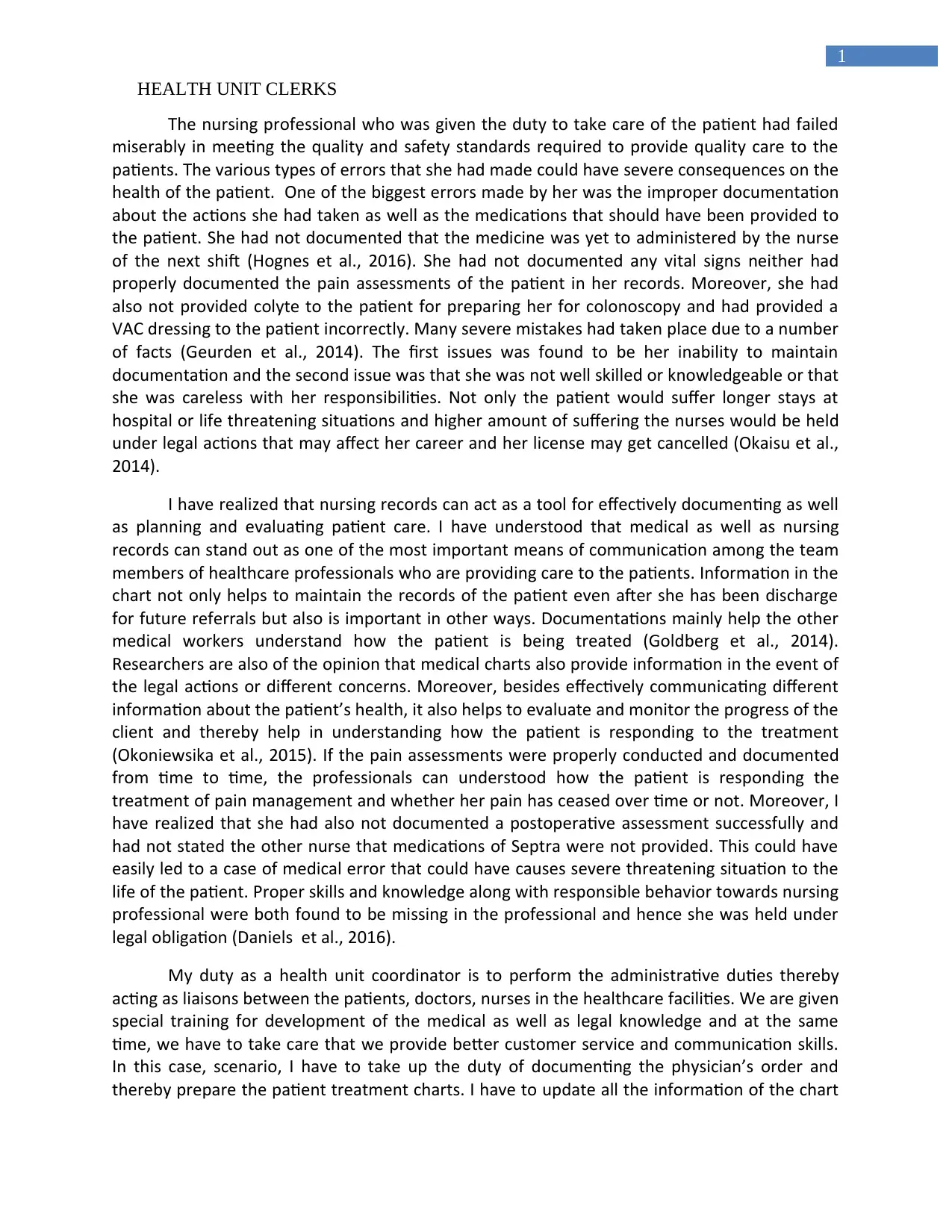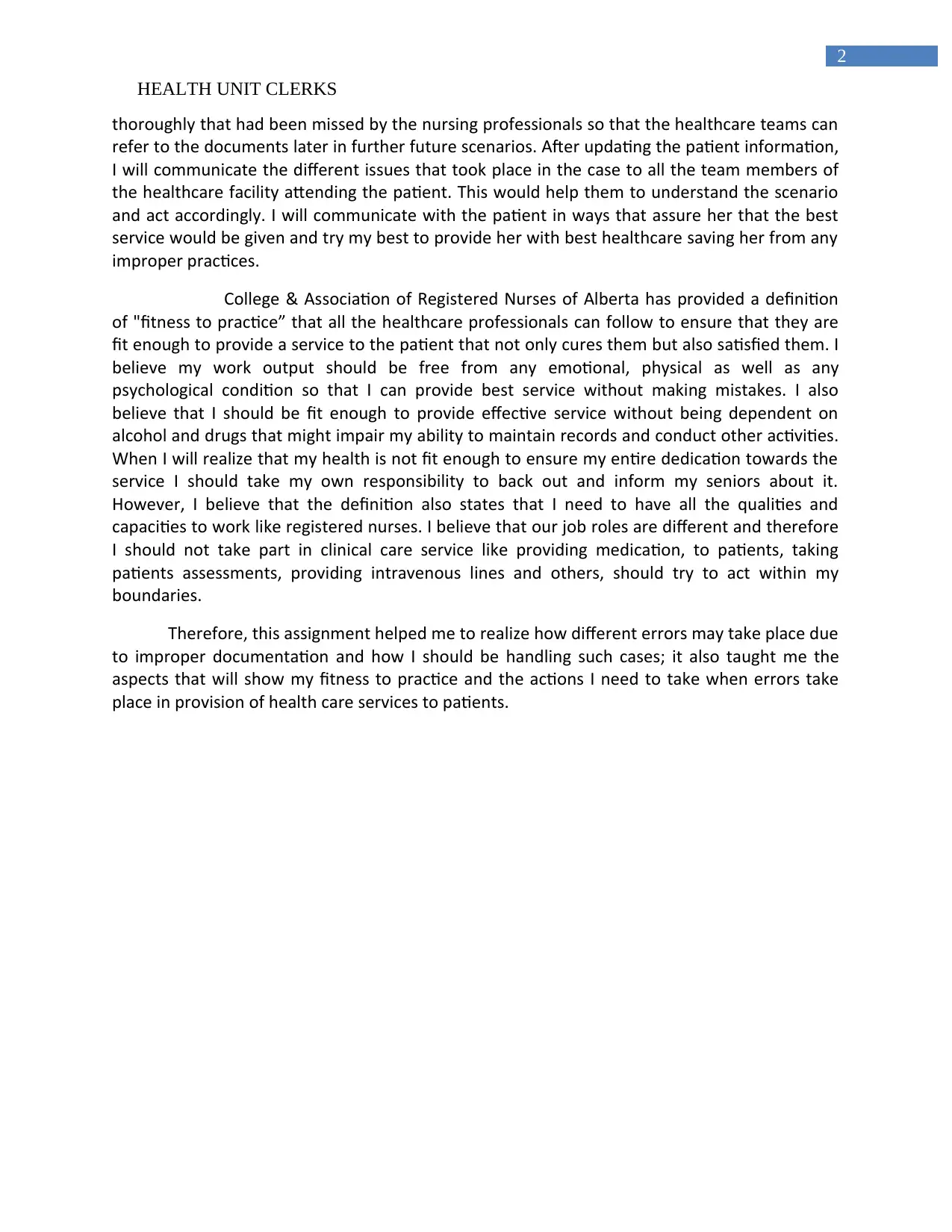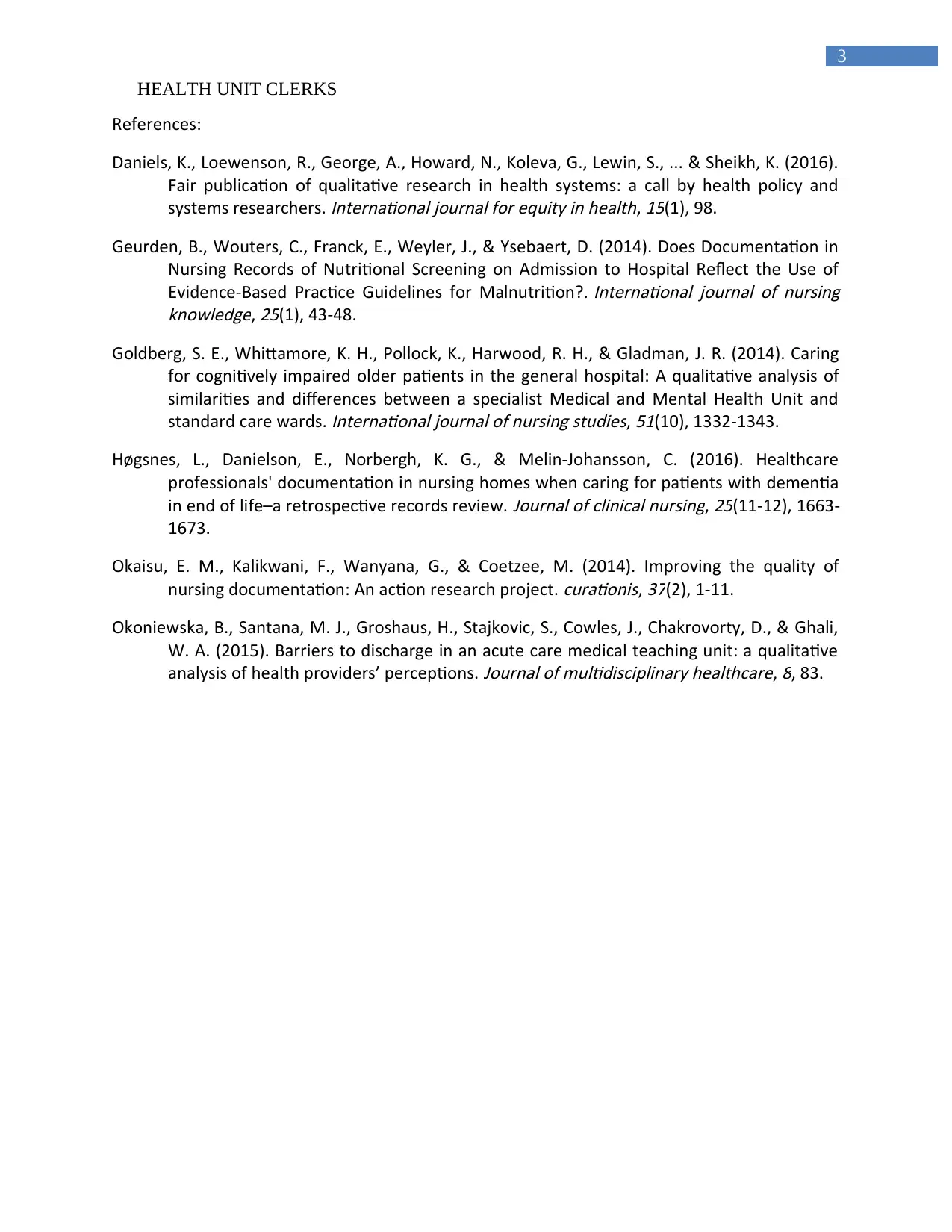Responsibilities of Health Unit Clerks: Documentation and Patient Care
VerifiedAdded on 2023/06/11
|4
|1448
|283
AI Summary
This assignment reflects on the critical role of health unit clerks and coordinators in maintaining accurate patient documentation and ensuring fitness to practice. The author analyzes a scenario involving a nursing professional's documentation errors, highlighting the potential consequences for patient safety and legal ramifications. The reflection emphasizes the importance of thorough documentation, proper pain assessments, and adherence to professional standards. The assignment further explores the responsibilities of a health unit coordinator in documenting physician orders, updating patient charts, and communicating effectively with healthcare teams. The author reflects on the definition of "fitness to practice" and the importance of maintaining physical, emotional, and psychological well-being to provide quality patient care. The reflection concludes by emphasizing the importance of recognizing one's limitations and adhering to professional boundaries, reinforcing the significance of accurate documentation and responsible behavior in healthcare settings.

Running head: HEALTH UNIT CLERKS
HEALTH UNIT COORDINATORS
Name of the student:
Name of the university:
Author note:
HEALTH UNIT COORDINATORS
Name of the student:
Name of the university:
Author note:
Paraphrase This Document
Need a fresh take? Get an instant paraphrase of this document with our AI Paraphraser

1
HEALTH UNIT CLERKS
The nursing professional who was given the duty to take care of the patient had failed
miserably in meeting the quality and safety standards required to provide quality care to the
patients. The various types of errors that she had made could have severe consequences on the
health of the patient. One of the biggest errors made by her was the improper documentation
about the actions she had taken as well as the medications that should have been provided to
the patient. She had not documented that the medicine was yet to administered by the nurse
of the next shift (Hognes et al., 2016). She had not documented any vital signs neither had
properly documented the pain assessments of the patient in her records. Moreover, she had
also not provided colyte to the patient for preparing her for colonoscopy and had provided a
VAC dressing to the patient incorrectly. Many severe mistakes had taken place due to a number
of facts (Geurden et al., 2014). The first issues was found to be her inability to maintain
documentation and the second issue was that she was not well skilled or knowledgeable or that
she was careless with her responsibilities. Not only the patient would suffer longer stays at
hospital or life threatening situations and higher amount of suffering the nurses would be held
under legal actions that may affect her career and her license may get cancelled (Okaisu et al.,
2014).
I have realized that nursing records can act as a tool for effectively documenting as well
as planning and evaluating patient care. I have understood that medical as well as nursing
records can stand out as one of the most important means of communication among the team
members of healthcare professionals who are providing care to the patients. Information in the
chart not only helps to maintain the records of the patient even after she has been discharge
for future referrals but also is important in other ways. Documentations mainly help the other
medical workers understand how the patient is being treated (Goldberg et al., 2014).
Researchers are also of the opinion that medical charts also provide information in the event of
the legal actions or different concerns. Moreover, besides effectively communicating different
information about the patient’s health, it also helps to evaluate and monitor the progress of the
client and thereby help in understanding how the patient is responding to the treatment
(Okoniewsika et al., 2015). If the pain assessments were properly conducted and documented
from time to time, the professionals can understood how the patient is responding the
treatment of pain management and whether her pain has ceased over time or not. Moreover, I
have realized that she had also not documented a postoperative assessment successfully and
had not stated the other nurse that medications of Septra were not provided. This could have
easily led to a case of medical error that could have causes severe threatening situation to the
life of the patient. Proper skills and knowledge along with responsible behavior towards nursing
professional were both found to be missing in the professional and hence she was held under
legal obligation (Daniels et al., 2016).
My duty as a health unit coordinator is to perform the administrative duties thereby
acting as liaisons between the patients, doctors, nurses in the healthcare facilities. We are given
special training for development of the medical as well as legal knowledge and at the same
time, we have to take care that we provide better customer service and communication skills.
In this case, scenario, I have to take up the duty of documenting the physician’s order and
thereby prepare the patient treatment charts. I have to update all the information of the chart
HEALTH UNIT CLERKS
The nursing professional who was given the duty to take care of the patient had failed
miserably in meeting the quality and safety standards required to provide quality care to the
patients. The various types of errors that she had made could have severe consequences on the
health of the patient. One of the biggest errors made by her was the improper documentation
about the actions she had taken as well as the medications that should have been provided to
the patient. She had not documented that the medicine was yet to administered by the nurse
of the next shift (Hognes et al., 2016). She had not documented any vital signs neither had
properly documented the pain assessments of the patient in her records. Moreover, she had
also not provided colyte to the patient for preparing her for colonoscopy and had provided a
VAC dressing to the patient incorrectly. Many severe mistakes had taken place due to a number
of facts (Geurden et al., 2014). The first issues was found to be her inability to maintain
documentation and the second issue was that she was not well skilled or knowledgeable or that
she was careless with her responsibilities. Not only the patient would suffer longer stays at
hospital or life threatening situations and higher amount of suffering the nurses would be held
under legal actions that may affect her career and her license may get cancelled (Okaisu et al.,
2014).
I have realized that nursing records can act as a tool for effectively documenting as well
as planning and evaluating patient care. I have understood that medical as well as nursing
records can stand out as one of the most important means of communication among the team
members of healthcare professionals who are providing care to the patients. Information in the
chart not only helps to maintain the records of the patient even after she has been discharge
for future referrals but also is important in other ways. Documentations mainly help the other
medical workers understand how the patient is being treated (Goldberg et al., 2014).
Researchers are also of the opinion that medical charts also provide information in the event of
the legal actions or different concerns. Moreover, besides effectively communicating different
information about the patient’s health, it also helps to evaluate and monitor the progress of the
client and thereby help in understanding how the patient is responding to the treatment
(Okoniewsika et al., 2015). If the pain assessments were properly conducted and documented
from time to time, the professionals can understood how the patient is responding the
treatment of pain management and whether her pain has ceased over time or not. Moreover, I
have realized that she had also not documented a postoperative assessment successfully and
had not stated the other nurse that medications of Septra were not provided. This could have
easily led to a case of medical error that could have causes severe threatening situation to the
life of the patient. Proper skills and knowledge along with responsible behavior towards nursing
professional were both found to be missing in the professional and hence she was held under
legal obligation (Daniels et al., 2016).
My duty as a health unit coordinator is to perform the administrative duties thereby
acting as liaisons between the patients, doctors, nurses in the healthcare facilities. We are given
special training for development of the medical as well as legal knowledge and at the same
time, we have to take care that we provide better customer service and communication skills.
In this case, scenario, I have to take up the duty of documenting the physician’s order and
thereby prepare the patient treatment charts. I have to update all the information of the chart

2
HEALTH UNIT CLERKS
thoroughly that had been missed by the nursing professionals so that the healthcare teams can
refer to the documents later in further future scenarios. After updating the patient information,
I will communicate the different issues that took place in the case to all the team members of
the healthcare facility attending the patient. This would help them to understand the scenario
and act accordingly. I will communicate with the patient in ways that assure her that the best
service would be given and try my best to provide her with best healthcare saving her from any
improper practices.
College & Association of Registered Nurses of Alberta has provided a definition
of "fitness to practice” that all the healthcare professionals can follow to ensure that they are
fit enough to provide a service to the patient that not only cures them but also satisfied them. I
believe my work output should be free from any emotional, physical as well as any
psychological condition so that I can provide best service without making mistakes. I also
believe that I should be fit enough to provide effective service without being dependent on
alcohol and drugs that might impair my ability to maintain records and conduct other activities.
When I will realize that my health is not fit enough to ensure my entire dedication towards the
service I should take my own responsibility to back out and inform my seniors about it.
However, I believe that the definition also states that I need to have all the qualities and
capacities to work like registered nurses. I believe that our job roles are different and therefore
I should not take part in clinical care service like providing medication, to patients, taking
patients assessments, providing intravenous lines and others, should try to act within my
boundaries.
Therefore, this assignment helped me to realize how different errors may take place due
to improper documentation and how I should be handling such cases; it also taught me the
aspects that will show my fitness to practice and the actions I need to take when errors take
place in provision of health care services to patients.
HEALTH UNIT CLERKS
thoroughly that had been missed by the nursing professionals so that the healthcare teams can
refer to the documents later in further future scenarios. After updating the patient information,
I will communicate the different issues that took place in the case to all the team members of
the healthcare facility attending the patient. This would help them to understand the scenario
and act accordingly. I will communicate with the patient in ways that assure her that the best
service would be given and try my best to provide her with best healthcare saving her from any
improper practices.
College & Association of Registered Nurses of Alberta has provided a definition
of "fitness to practice” that all the healthcare professionals can follow to ensure that they are
fit enough to provide a service to the patient that not only cures them but also satisfied them. I
believe my work output should be free from any emotional, physical as well as any
psychological condition so that I can provide best service without making mistakes. I also
believe that I should be fit enough to provide effective service without being dependent on
alcohol and drugs that might impair my ability to maintain records and conduct other activities.
When I will realize that my health is not fit enough to ensure my entire dedication towards the
service I should take my own responsibility to back out and inform my seniors about it.
However, I believe that the definition also states that I need to have all the qualities and
capacities to work like registered nurses. I believe that our job roles are different and therefore
I should not take part in clinical care service like providing medication, to patients, taking
patients assessments, providing intravenous lines and others, should try to act within my
boundaries.
Therefore, this assignment helped me to realize how different errors may take place due
to improper documentation and how I should be handling such cases; it also taught me the
aspects that will show my fitness to practice and the actions I need to take when errors take
place in provision of health care services to patients.
⊘ This is a preview!⊘
Do you want full access?
Subscribe today to unlock all pages.

Trusted by 1+ million students worldwide

3
HEALTH UNIT CLERKS
References:
Daniels, K., Loewenson, R., George, A., Howard, N., Koleva, G., Lewin, S., ... & Sheikh, K. (2016).
Fair publication of qualitative research in health systems: a call by health policy and
systems researchers.
International journal for equity in health,
15(1), 98.
Geurden, B., Wouters, C., Franck, E., Weyler, J., & Ysebaert, D. (2014). Does Documentation in
Nursing Records of Nutritional Screening on Admission to Hospital Reflect the Use of
Evidence‐Based Practice Guidelines for Malnutrition?.
International journal of nursing
knowledge,
25(1), 43‐48.
Goldberg, S. E., Whittamore, K. H., Pollock, K., Harwood, R. H., & Gladman, J. R. (2014). Caring
for cognitively impaired older patients in the general hospital: A qualitative analysis of
similarities and differences between a specialist Medical and Mental Health Unit and
standard care wards.
International journal of nursing studies,
51(10), 1332‐1343.
Høgsnes, L., Danielson, E., Norbergh, K. G., & Melin‐Johansson, C. (2016). Healthcare
professionals' documentation in nursing homes when caring for patients with dementia
in end of life–a retrospective records review.
Journal of clinical nursing,
25(11‐12), 1663‐
1673.
Okaisu, E. M., Kalikwani, F., Wanyana, G., & Coetzee, M. (2014). Improving the quality of
nursing documentation: An action research project.
curationis,
37(2), 1‐11.
Okoniewska, B., Santana, M. J., Groshaus, H., Stajkovic, S., Cowles, J., Chakrovorty, D., & Ghali,
W. A. (2015). Barriers to discharge in an acute care medical teaching unit: a qualitative
analysis of health providers’ perceptions.
Journal of multidisciplinary healthcare,
8, 83.
HEALTH UNIT CLERKS
References:
Daniels, K., Loewenson, R., George, A., Howard, N., Koleva, G., Lewin, S., ... & Sheikh, K. (2016).
Fair publication of qualitative research in health systems: a call by health policy and
systems researchers.
International journal for equity in health,
15(1), 98.
Geurden, B., Wouters, C., Franck, E., Weyler, J., & Ysebaert, D. (2014). Does Documentation in
Nursing Records of Nutritional Screening on Admission to Hospital Reflect the Use of
Evidence‐Based Practice Guidelines for Malnutrition?.
International journal of nursing
knowledge,
25(1), 43‐48.
Goldberg, S. E., Whittamore, K. H., Pollock, K., Harwood, R. H., & Gladman, J. R. (2014). Caring
for cognitively impaired older patients in the general hospital: A qualitative analysis of
similarities and differences between a specialist Medical and Mental Health Unit and
standard care wards.
International journal of nursing studies,
51(10), 1332‐1343.
Høgsnes, L., Danielson, E., Norbergh, K. G., & Melin‐Johansson, C. (2016). Healthcare
professionals' documentation in nursing homes when caring for patients with dementia
in end of life–a retrospective records review.
Journal of clinical nursing,
25(11‐12), 1663‐
1673.
Okaisu, E. M., Kalikwani, F., Wanyana, G., & Coetzee, M. (2014). Improving the quality of
nursing documentation: An action research project.
curationis,
37(2), 1‐11.
Okoniewska, B., Santana, M. J., Groshaus, H., Stajkovic, S., Cowles, J., Chakrovorty, D., & Ghali,
W. A. (2015). Barriers to discharge in an acute care medical teaching unit: a qualitative
analysis of health providers’ perceptions.
Journal of multidisciplinary healthcare,
8, 83.
1 out of 4
Related Documents
Your All-in-One AI-Powered Toolkit for Academic Success.
+13062052269
info@desklib.com
Available 24*7 on WhatsApp / Email
![[object Object]](/_next/static/media/star-bottom.7253800d.svg)
Unlock your academic potential
Copyright © 2020–2025 A2Z Services. All Rights Reserved. Developed and managed by ZUCOL.





